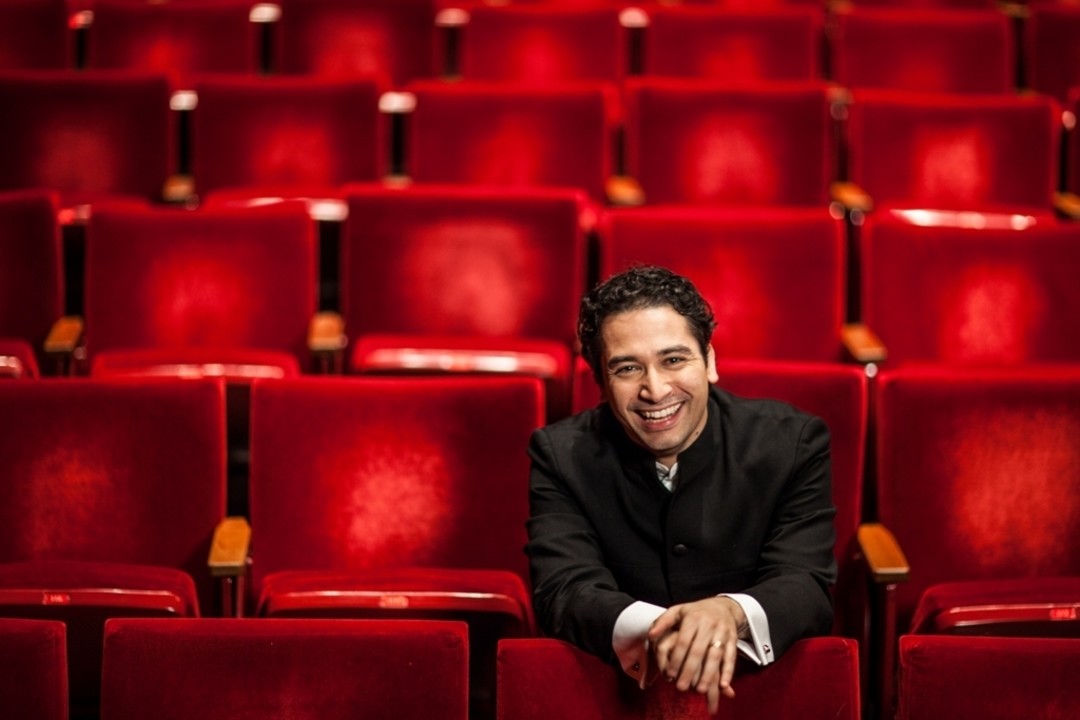Does Andrés Orozco-Estrada Have Too Many Jobs?

Image: Julie Soefer
Last week, the London Philharmonic Orchestra announced the appointment of Andrés Orozco-Estrada as its principal guest conductor, beginning in September 2015. The new position is merely the latest in a string of high-profile appointments and guest conducting appearances for the 36-year-old Colombian-born and Viennese-trained wunderkind, who will take over as Houston Symphony music director for the 2014–2015 season. In addition to his Houston Symphony position, Orozco-Estrada is currently the chief conductor of the Frankfurt Radio Symphony and the director of Vienna’s Tonkünstler Orchestra. He’ll be giving up his post with the Tonkünstler Orchestra at the end of the 2014–2015 season, just in time to take up his new responsibilities with the London Philharmonic.
Orozco-Estrada’s contract with the Houston Symphony calls for him to conduct 12 weeks of concerts each year, in addition to performing off-podium work like artistic planning, fundraising, and holding auditions for new orchestra positions. Although he’s looking for a residence in Houston, Orozco-Estrada and his family will continue dividing their time between here and his home in Frankfurt, the site of his other primary position with the Frankfurt Radio Symphony—a position that requires a similar time commitment to his work with the Houston Symphony.
“He’s our artistic leader, and he thinks about the Houston Symphony almost non-stop, but being the music director does not require 365 days of residency,” Hanson said. “It’s an arrangement and a reality of our industry that works quite well.”
Houston Symphony CEO Mark Hanson told me that the multiple jobs are a testament to Orozco-Estrada’s burgeoning reputation.
“It all speaks to the talent that he possesses, that we at the Houston Symphony are able to tap into,” Hanson said. “And all of that guest conducting and the other appointments are wonderful opportunities for the name and the reputation of the Houston Symphony to be shared as broadly as possible throughout the globe."
While it’s true that most conductors hold more than one position simultaneously, Orozco-Estrada’s apparent eagerness to accept new responsibilities before he’s even taken up the baton in Houston does raise questions about his long-term commitment to the city. When Orozco-Estrada’s predecessor Hans Graf become the Houston Symphony music director in 2001, he moved quickly to wind down his previous positions, relinquishing his roles at the Calgary Philharmonic in 2003 and the Orchestre National Bordeaux Aquitaine in 2004. Although he maintained a busy schedule as a guest conductor for orchestras around the world, and divided his time between residences in Salzburg and Houston, there was never any question that the Houston Symphony was his primary focus.
When asked how Orozco-Estrada would be able to devote his full attention to the Houston Symphony with so many competing responsibilities, Hanson said that conductors holding multiple positions was simply part of today’s classical music business. “He’s our artistic leader, and he thinks about the Houston Symphony almost non-stop, but being the music director does not require 365 days of residency,” Hanson said. “It’s an arrangement and a reality of our industry that works quite well.”
Former Houston Chronicle classical music critic Charles Ward said that it wasn’t surprising for a young, in-demand conductor like Orozco-Estrada to take several positions, but warned that there was a limit to how much one person can do.
“It’s not at all unusual for a conductor to have one or two other announced positions,” Ward said. “Anything more than three is starting to get outside the norm, and you start to wonder whether the guy’s a workaholic.”
As to whether Orozco-Estrada will be accepting any more titled positions in the future, Hanson said he considered it unlikely.
“I think his plate is getting pretty full.”




